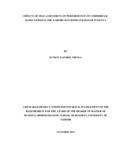| dc.description.abstract | Business organizations are faced with the challenge of achieving economic sustainability
and success while limiting the impact that their activities, products, or services may have
on the environment and human health. One of the challenges facing organizations is the
need for the adoption of performance-improving innovations. The objective of selfassessment
is to identify and act on the areas of the improvement process that require
additional effort, while recognizing and maintaining that which is already going well
These performance insights result in organizations realizing that they need to achieve
radical performance improvements merely to survive, let alone prosper and be
recognized. Commercial banks listed in the Nairobi Securities Exchange (NSE) represent
a significant and influential sector of business that plays a crucial role in the Kenyan
economy. Competitiveness among them has been on the increase over the years with
banks coming up with innovative products to woe customers over their competitors. This
has given rise to many of them adopting the self-appraisal model as a way of improving
performance both financial and anion-financial as reflected on their books of account and
in their reputation. The study was done on 10 commercial banks using descriptive study
in order to establish whether self-appraisal affects performance. A questionnaire was the
major instrument used to gather primary data while past records from the NSE and CMA
library were also used to supplement the major instrument and findings analyzed using
regression analysis. The research noted that listed commercial banks have focused more
attention on developing the link between the self-assessment criteria and the business
policy development and business planning. Consequently, the leading commercial banks
perform self-assessment from the bottom of the organization by initiating internal
assessments according to the procedures described in relation to the award guidelines.
This has contributed to a great proportion in improving their performance. The study
recommends stakeholders to be willing to take proactive action, be innovative, and
assume integrated improvement activities to achieve sustainable competitive advantage
and superior performance. Further, it recommends to the management to adapt selfassessment
as a method for driving continuous improvement activities in a planned way
by giving meaning to quality and providing a framework for directing the quality
activities. However, further research is recommended for other listed companies in the
NSE to facilitate generalization of the findings and conclusively identify the relationship
between self-assessment and performance in the NSE. | en_US |

